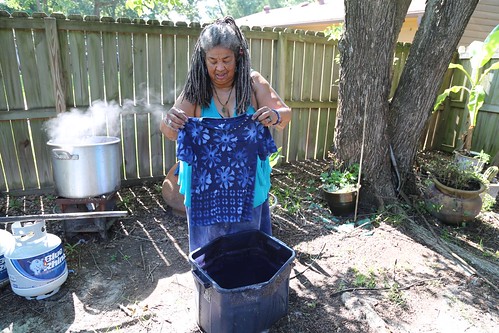Arianne King Comer: IBILE! Ancestral Call in Cloth
IBILE! Ancestral Call in Cloth, is the latest iteration of a CALL & RESPONSE residency we began with artist and indigo advocate Arianne King Comer in 2017. Over the years, King Comer has collaborated with several of her fellow CALL & RESPONSE artists, including Portia Cobb, Reggie Wilson, Scott Alves Barton, and Daniel Minter. She is also a member of the HOME Refugee Steering Committee.
This summer, Comer joins us following a residency at Indigo Arts Alliance, an organization co-founded by Daniel Minter. During her two-week residency at Lynden, she will resume her all ages, open-air, indigo-dyeing studio, inviting groups and individuals to join her at the dyeing vat as she relates the history of indigo and teaches different resist-dyeing methods, particularly traditional batik, adire (Yoruba), and shibori (Japanese) techniques of designing on cloth.
While at Lynden, Comer will gather the artists and community members who participated in the HEALING COATS exhibition for workshops. These workshops will bring together local refugees, members of Indigenous, immigrant, and Black communities, and artists from further afield who Comer invited to create coats during the pandemic. The exhibition begins to tour in the fall, and we have been filming video interviews with the makers that will travel with the show.
Comer's residency will intersect with Pulang Balik, Kim Khaira's residency that focuses on her personal art practice and work with Milwaukee's refugee communities. Comer's studio will be open for drop-in dyeing during HOME Music and Dance Day on July 15.
About the Artist
Textile artist Arianne King Comer is interested in the cultural traditions of the African Diaspora, and much of her research focuses on indigo cultivation and dyeing. Comer travels with wax pans, imprinting stamps from the countries that practice batik, a collection of dyes--including indigo--for cotton and silk, and examples of textiles from her collection. As an indigo advocate, she shares a native South Carolina indigo plant and several films on the indigo process in various countries, including the iconic Daughters of the Dust. Indigo has an ancient history and was found in many different parts of the world, but in the 18th century the Sea Islands of South Carolina were a center of indigo production, and Charleston exported vast amounts of indigo. (Along with rice and cotton, indigo formed the basis of South Carolina’s wealth.) Indigo was the foundation of many West African textile traditions, where women, in particular, were known for their dyeing expertise, and enslaved West Africans worked the labor-intensive indigo plantations.
Open Studio Schedule 2023
Pre-registration required. Register online or by phone at 414-446-8794.
Friday, July 14, 10:30 am-3:30 pm
Monday, July 17, 10:30 am-3:30 pm
Thursday, July 20, 10:30 am-3:30 pm

